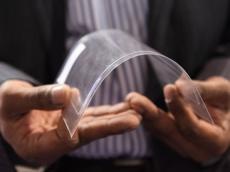|
|
TODAY.AZ / Weird / Interesting
Canadian researcher creates flexible glass
08 February 2014 [10:15] - TODAY.AZ
 Professor Barthelat operates McGill’s Biomemetic Laboratory (bio-mimicry) which seeks to find out how nature has solved certain structural or functional problems and use that as the basis to engineer better man-made materials.
Professor Barthelat operates McGill’s Biomemetic Laboratory (bio-mimicry) which seeks to find out how nature has solved certain structural or functional problems and use that as the basis to engineer better man-made materials.Mollusc shells for example are extremely resistant to impact in spite of being made of brittle materials.
In studying the strength of shells they found that to protect the brittle shell from breaking on impact, in the mother of pearl (Nacre) lining of the shells, nature had created a complex system of calcium and proteins to diffuse the impact energy to prevent cracking.
It consists of microscopic tablets-like miniature brick wall. An impact is diffused and absorbed along the weaker boundaries of the individual bricks/tablets. These millions of weak “interfaces” diffuse impacts
Professor Barthelat and team sought to recreate these weak boundaries in a man-made material, choosing glass which is strong but brittle, and using microscope slides for their material.
Using lasers they etched a network of 3D microcracks in the glass.
After developing a very particular pattern –similar to the way jigsaw puzzles interlock- they were able to recreate flexibility through these micro-cracks or interfaces in the glass slide.
In testing they found that the glass was now about 200 times more resistant to breaking from impact than a regular glass slide.
This meant that an impact would deform it slightly (bend/dent) but not break it as would be the case with a non-etched piece of glass which remained brittle.
While the research was for theoretical purposes, Professor Barthelat says there may be vast possibilities for the concept in many different materials and in different applications to create flexibility and energy absorption from impacts in previously brittle materials.
The research was funded by the Natural Sciences and Engineering Research Council of Canada (NSERC) and the Canada Foundation for Innovation (CFI), with partial support for one of the authors from a McGill Engineering Doctoral Award. The authors acknowledge useful technical advice by the company Vitro.
/AzerTAc/
URL: http://www.today.az/news/interesting/130739.html
 Print version
Print version
Views: 2227
Connect with us. Get latest news and updates.
See Also
- 19 February 2025 [22:20]
Visa and Mastercard can return to Russia, but with restrictions - 05 February 2025 [19:41]
Japan plans to negotiate with Trump to increase LNG imports from United States - 23 January 2025 [23:20]
Dubai once again named cleanest city in the world - 06 December 2024 [22:20]
Are scented candles harmful to health? - 23 November 2024 [14:11]
Magnitude 4.5 earthquake hits Azerbaijan's Lachin - 20 November 2024 [23:30]
Launch vehicle with prototype of Starship made its sixth test flight - 27 October 2024 [09:00]
Fuel prices expected to rise in Sweden - 24 October 2024 [19:14]
Turkiye strikes terror targets in Iraq and Syria - 23 October 2024 [23:46]
Kazakhstan supplied almost entire volume of oil planned for 2024 to Germany in 9 months - 23 October 2024 [22:17]
Taiwan reported passage of Chinese Navy aircraft carrier near island
Most Popular
 Victim testimonies heard as trial of Ruben Vardanyan continues in Baku Military Court
Victim testimonies heard as trial of Ruben Vardanyan continues in Baku Military Court
 Turkiye expands its African sphere of influence with bold Libya shift
Turkiye expands its African sphere of influence with bold Libya shift
 Justice Minister says terror-free Turkiye is essential for nation’s future
Justice Minister says terror-free Turkiye is essential for nation’s future
 Azerbaijan, US discuss progress on Middle Corridor and Zangazur Corridor
Azerbaijan, US discuss progress on Middle Corridor and Zangazur Corridor
 Baku hosts D-8 media forum bringing together global media leaders
Baku hosts D-8 media forum bringing together global media leaders
 US approves semiconductor sales to UAE and Saudi Arabia
US approves semiconductor sales to UAE and Saudi Arabia
 Armenian civil society delegation arrives in Baku for continued peace dialogue
Armenian civil society delegation arrives in Baku for continued peace dialogue
